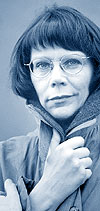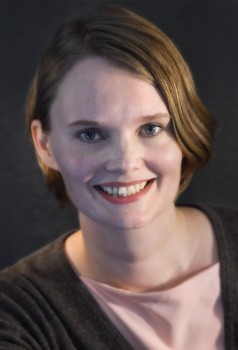Search results for "kristina_carlson"
New literary prize
6 May 2011 | In the news
A new literary prize was founded in 2010 by an association bearing the name of Jarkko Laine (1947–2006) – poet, writer, playwright, translator, long-time editor of the literary journal Parnasso and chair of the Finnish Writers’s Union.
The Jarkko Laine Literary Prize will be awarded to a ‘challenging new literary work’ published during the previous two years. The jury, of nine members, will announce the winner on 19 May.
The shortlist for the first prize is made of Kristina Carlson’s novel Herra Darwinin puutarhuri (‘Mr Darwin’s gardener’, Otava, 2009), Juha Kulmala’s collection of poems, Emme ole dodo (‘We are not dodo’, Savukeidas, 2009) and Erik Wahlström’s novel Flugtämjaren (‘Fly tamer’, Finnish translation Kärpäsenkesyttäjä, Schildts, 2010).
The prize money, €10,000, comes jointly from the publishing houses Otava, Otavamedia and WSOY, the Haavikko Foundation, the City of Turku and the University of Turku.
It’s four o’clock and the dog is puzzled
26 September 2013 | This 'n' that
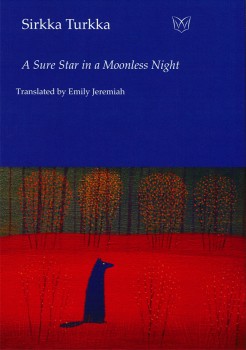
Cover image: ‘Autumn reflections’ by author and painter Saara Tikka
Apart from writing poetry for forty years, Sirkka Turkka has worked as a stable master and as a librarian – and she is a wizard in creating portraits of dogs in her poems.
‘Something kept me awake late. Something woke me up early. It’s four o’clock and the dog is puzzled. He tries to continue his dream: he was just about to catch a squirrel he barked at all of yesterday. He leaves me quite alone in silence, in which not a single breeze stirs. What is in the past ceases to be, what is to come has no significance. There is only the sun, just about to come up. And the calm surface of the lake and the coffee cup, from which leisurely steam rises.’ (From Minä se olen [‘It’s me’], 1973)
Elk, horse, raven, reindeer, jackdaw, fox. Turkka’s universe is populated with creatures, often wiser than man: man may have lost his heart, or ‘he thinks it’s a distant land’, but ‘in dogs the heart is where it should be: just after the muzzle, boulder-like, baby-faced and willing.’ (From Yö aukeaa kuin vilja [‘The night opens like corn’], 1978).
Emily Jeremiah, scholar and translator (her work includes poems by Eeva-Liisa Manner, novels by Asko Sahlberg and Kristina Carlson), found Turkka’s creatures a while ago, and as a result a selection of Turkka’s poems, entitled A Sure Star in a Moonless Night, was published recently by Waterloo Press (UK).
Melancholy: it does go well with autumn, doesn’t it? ‘Once more the stars are like a tearful ballad, and always in the evenings / the dogs tune their cracked violins.’ (From Mies joka rakasti vaimoaan liikaa [‘The man who loved his wife too much’, 1979])
Katri Lipson: Jäätelökauppias [The ice-cream vendor]
25 October 2012 | Mini reviews, Reviews
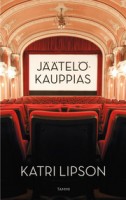 Jäätelökauppias
Jäätelökauppias
[The ice-cream vendor]
Helsinki: Tammi, 2012. 300 p.
ISBN 978-951-31-6868-1
€ 36.20, hardback
The Finnish novel of the 2000s has been successfully set in other cultures. Like Kristina Carlson and Sofi Oksanen, Katri Lipson went her own way as an author in her award-winning debut novel Kosmonautti (‘Cosmonaut’, 2008), which was set in the Soviet Union of the 1980s. In her second novel Lipson (born 1965), who works as a doctor in Helsinki, portrays life in post-war Czechoslovakia. The novel begins with the making of a film. The director wants to work without a script, which is only in her head. The filming proceeds chronologically, so that the actors will not anticipate what happens to the characters in the future. The film tells the story of a man and a woman’s flight from danger in 1942. Although they do not know each other, they pretend to be a married couple and hide in the countryside. What will be their fate during the war and afterwards is left to the reader; the characters can be combined with those appearing in the novel’s later stages, in the 1960s and even the 1980s. Lipson’s technique boldly breaks with the supremacy of narrative and calls into question the construction of historical truth.
Translated by David McDuff
Seekers and givers of meaning: what the writer said
2 October 2014 | This 'n' that
 ‘All our tales, stories, and creative endeavours are stories about ourselves. We repeat the same tale throughout our lives, from the cradle to the grave.’ CA
‘All our tales, stories, and creative endeavours are stories about ourselves. We repeat the same tale throughout our lives, from the cradle to the grave.’ CA
‘Throughout a work’s journey, the writer filters meanings from the fog of symbols and connects things to one another in new ways. Thus, the writer is both a seeker of meaning and a giver of meaning.’ OJ
‘Words are behind locks and the key is lost. No one can seek out another uncritically except in poetry and love. When this happens the doors have opened by themselves.’ EK
‘I realised that I had to have the courage to write my kind of books, not books excessively quoting postmodern French philosophers, even if that meant laying myself open to accusations of nostalgia and sentimentality.’ KW
‘If we look at the writing process as consisting of three C:s – Craft, Creativity and Chaos – each one of them is in its way indispensable, but I would definitely go for chaos, for in chaos lies vision.’ MF
‘In the historical novel the line between the real and the imagined wavers like torchlight on a wall. The merging of fantasy and reality is one of the essential features of the historical novel.’ KU
‘The writer’s block isn’t emptiness. It’s more like a din inside your head, the screams of shame and fear and self-hatred echoing against one another. What right have I to have written anything in the first place? I have nothing to say!’ PT
‘…sometimes stanzas have to / assume the torch-bearer’s role – one / often avoided like the plague. / Resilient and infrangible, the lines have to / get on with their work, like a termite queen / laying an egg every three seconds / for twenty years, / leaving a human to notice / their integrity. ’ JI
In 2007 when Books from Finland was a printed journal, we began a series entitled On writing and not writing; in it, Finnish authors ponder the complexities, pros and cons of their profession. Now our digitised archives make these writings available to our online readers: how do Claes Andersson, Olli Jalonen, Eeva Kilpi, Kjell Westö, Monika Fagerholm, Kaari Utrio, Petri Tamminen and Jouni Inkala describe the process? Pain must coexist with pleasure…
From 2009 – when Books from Finland became an online journal – more writers have made their contributions: Alexandra Salmela, Susanne Ringell, Jyrki Kiiskinen, Johanna Sinisalo, Markku Pääskynen, Ilpo Tiihonen, Kristina Carlson, Tuomas Kyrö, Sirpa Kähkönen – the next, shortly, will be Jari Järvelä.
Finlandia Prize candidates 2011
17 November 2011 | In the news
 The candidates for the Finlandia Prize for Fiction 2011 are Eeva-Kaarina Aronen, Kristina Carlson, Laura Gustafsson, Laila Hirvisaari, Rosa Liksom and Jenni Linturi.
The candidates for the Finlandia Prize for Fiction 2011 are Eeva-Kaarina Aronen, Kristina Carlson, Laura Gustafsson, Laila Hirvisaari, Rosa Liksom and Jenni Linturi.
Their novels, respectively, are Kallorumpu (‘Skull drum’, Teos), William N. Päiväkirja (‘William N. Diary’, Otava), Huorasatu (‘Whore tale’, Into), Minä, Katariina (‘I, Catherine’, Otava), Hytti no 6 (‘Compartment number 6’, WSOY) and Isänmaan tähden (‘For fatherland’s sake’, Teos).
Kallorumpu takes place in 1935 in Marshal Mannerheim’s house in Helsinki and in the present time. Laila Hirvisaari is a popular writer of mostly historical fiction: Minä, Katariina, a portrait of Russia’s Catherine the Great, is her 39th novel. Gustafsson’s and Linturi’s novels are first works; the former is a bold farce based on women’s mythology, the latter is about guilt born of the Second World War.
The jury – journalist and critic Hannu Marttila, journalist Tuula Ketonen and translator Kristiina Rikman – made their choice out of 130 novels. The winner, chosen by the theatre manager of the KOM Theatre Pekka Milonoff, will be announced on the first of December. The prize is worth 30,000 euros. It has been awarded since 1984, to novels only from 1993.
The fact that this time all the candidates are women has naturally been the object of criticism: why are the popular male writers’ books of 2011 missing from the list?
Another thing that these novels share is history: five of them are totally or partially set in the past – Finland in 1935, Paris in the 1890s, Russia/Soviet Union in the 18th century and in the 1980s, and 1940s Finland during the Second World War. Even the sixth, Huorasatu, bases its depiction of the present day in women’s prehistory, patriarchy and the ancient myths.
The jury’s chair, Hannu Marttila, commented: ‘This book year is sure to be remembered for a generational and gender change among those who write literature about the Second World War in Finland. Young woman writers describe the war with probably greater diversity than before. From the non-fiction writing of recent years it is clear that the struggles and difficulties of the home front are increasingly being recognised as part of the general struggle for survival, and on the other hand the less heroic aspects of war, the shameful and criminal elements, have also become acceptable as objects of study.’
Marttila concluded his speech: ‘When picking mushrooms in the forest, I have learned that it is often worth humbly peeking under the grass, and that the most glaring cap is not necessarily the best…. Perhaps it is time to forget the old saying that there is literature, and then there is women’s literature.’
Slow down!
26 August 2011 | Letter from the Editors
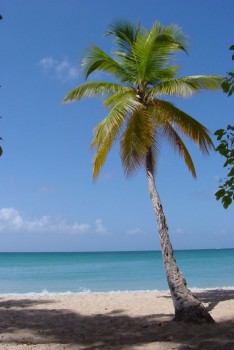
Books for a desert island? Photo: Patrick Verdier (Wikimedia)
Might Tolstoy’s War and Peace be the epitome of a novel that qualifies for reading on a desert island? (Maybe along with Tristram Shandy or Finnegan’s Wake, and possibly The Gateless Gate (the Zen Buddhist kōans). After all, who’s got time or energy for some 1,500 pages of a wartime story from the Napoleonic era with too many characters (580, and so many of them called Pierre)?
We do tend to consume everything quickly: busy busy! We eat fast, we talk fast, we exercise fast, we fast-forward through movies. We devour books like fast food. Hurry hurry! On to the next one, whatever it is, don’t hang about! More…
Candidates for the Runeberg Prize
23 December 2009 | In the news
Seven books were chosen out of approximately 200 to be the candidates of the Runeberg Prize, to be awarded on 5 February 2010. More…
Northern exposure
3 September 2005 | Archives online, Fiction, Prose
Extracts from the novel Valon reunalla (‘At the edge of light’, Teos, 2005). Introduction by Kristina Carlson
Kari
The village despised all those who left. They hated us too, though we were still only planning our final escape.
We used to escape the village. We would hide from its gaze in the forest or the cemetery where the gravestones were so close together that there was no room for the trees to grow. We knew why the freight train brought the village so many dead and so few living. It was the village’s fault. It had a wicked soul. The grown-ups didn’t know it. We knew it, but no one asked us. Death was within us; it was alive. Asking would have been too dangerous….
On the backs of the headstones we carved our own marks with the end of a knife. We blew out the candles laid at the graves of suicide victims. We worshipped them in the dark and no new candles were ever brought to their graves. The parents of those who died so young drove south. They were looking for stations with real waiting rooms and staff that made announcements. They sat on the hard benches waiting, waiting for the trains to come, at the right time; hoping the years wouldn’t wreak havoc after all, hoping they’d roll slowly back along the tracks, to brighten as they approached the village, giving life once again to their children. And everything could start over. More…
Jarkko Laine Prize 2011
1 June 2011 | In the news
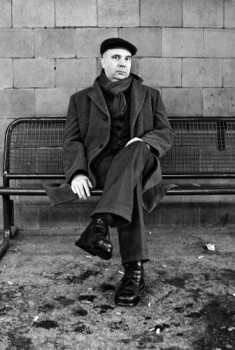
Juha Kulmala. Photo: Lotta Djupsund
The Jarkko Laine Literary Prize (see our news from 6 May), worth €10,000, was awarded to Juha Kulmala (born 1962) on 19 May for his collection of poems entitled Emme ole dodo (‘We are not dodo’, Savukeidas, 2009).
The prize is awarded to a ‘challenging new literary work’ published during the previous two years. Shortlisted were also two novels, Kristina Carlson’s Herra Darwinin puutarhuri (‘Mr Darwin’s gardener’, Otava, 2009) and Erik Wahlström’s Flugtämjaren (‘Fly tamer’, Finnish translation Kärpäsenkesyttäjä, Schildts, 2010).
Jarkko Laine (1947–2006) was a poet, writer, playwright, translator, long-time editor of the literary journal Parnasso and chair of the Finnish Writers’s Union.
Manmother
31 December 2002 | Archives online, Fiction, Prose
Extracts from the novel Granaattiomena (‘Pomegranate’, WSOY, 2002). Introduction by Kristina Carlson
The journey
Mother had sent her son to the island of Rome.
She’d sent him for pleasure and recreation, and also to have a little time by herself. Even though their life together was on an even keel, it was sensible to have some time away from each other. She herself was sixty-eight, and her son an unmarried hermit in his thirties, on sickness allowance for the last couple of years. He was afflicted with chronic depression. The doctors had been unable to identify the cause. The origin of a disorder of that sort was often looked for in some infant trauma; but the boy’s childhood, from all appearances, had been harmonious. One doctor suspected the time of his father’s terminal illness, when the boy had had to nurse his father for a long while. More…
Letter to the wind
30 September 2002 | Archives online, Fiction, Prose
A short story from Haapaperhonen (‘The butterfly’, Gummerus, 2002). Introduction by Kristina Carlson
When Father comes to visit me, he sometimes sings a hymn. I can’t ask him not to. But when he doesn’t, I wonder why not, whether there’s something up with him. I can’t ask him to sing, but something is missing, the same thing that there seems to be too much of when he sings. It’s too much, but I miss it when it’s not there. I wonder about it after Father’s gone; my thoughts curl into dreams and I sleep.
When I sleep I don’t know I’m here, in a strange place. I’m at home, sleeping at home, in my own bed. The window is the right size, not too big like it is here; here there isn’t really a window at all, half the wall is missing and instead there’s glass. Behind a glass wall it’s not safe, everything is taken through it, including me. But sleep takes me to safety; I’m at home there. I breathe it peacefully. In the cabin there are two breathings, mine and Turo’s, and in the bedroom Father’s breathing. They are in no hurry to drive time away; time can linger, sleep, the moment of night, and when sleep withdraws there is no hurry either; I can sit in peace on the window seat and gaze at the cloudy, moonlit yard. The apple tree is asleep; it’s the only one. The fieldfares ate the apples before we could pick them, but it did not bother me or Father. It was good to look at the flock of fieldfares making a meal of the apple tree. Then they went away. More…
Jarkko Nieminen: Pelaamisen lumo [The fascination of the game]
20 August 2009 | Mini reviews, Reviews
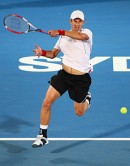 Pelaamisen lumo [The fascination of the game]
Pelaamisen lumo [The fascination of the game]
Helsinki: Avain, 2009. 175 p., ill.
978-952-5524-69-7
€ 38, hardback
Tennis is a curious game, as everyone who plays it knows – and even those who don’t, which is why it is such a popular sport. Although Jarkko Nieminen (born 1981), a professional player since 2000, has not yet won a Grand Slam event for Finland, in 2006 he was ranked no. 13. (Unfortunately, this spring Nieminen injured his wrist and missed the top matches of the season.) In this book (edited and published by his sister Anna-Riikka Carlson, who founded the publishing company Avain in 2003), Nieminen tells the story of his athletic career. ‘In Japan my visa said I was an “entertainer”,’ he recalls as he describes what it’s like to walk out on a court filled with thousands of spectators. Tennis is a gentleman’s game, a polite duel (or double), and Nieminen is certainly a gentleman par excellence. His personal story is designed to be strictly informative, as he chooses to keep his family life private, for example (his wife Anu, née Weckström, a Finnish multiple badminton champion, is referred to once). There is no doubt, though, that the reader will be convinced of Nieminen’s happy choice of an athletic profession.
Sofi Oksanen wins the 2008 Finlandia Prize
10 February 2009 | In the news
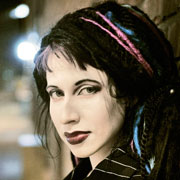
Sofi Oksanen. - Photo: Toni Härkönen/WSOY.
The Finlandia Prize for Fiction, Finland’s most prestigious literary prize, was awarded to Sofi Oksanen’s novel Puhdistus (‘Purge’, WSOY, 2008). ‘When the concentrated focus of drama and the multidimensionality of narrative conjoin, Puhdistus is born – a muscular, harsh, and solid book’, said the writer and critic Pekka Tarkka awarding the prize on 4 December. (For a short review, see the Review section.)
The prize, worth € 30,000, was awarded for the twenty-fifth time. The final choice was made from the shortlist of six candidates; the others were 14 solmua Greenwichiin (‘14 knots to Greenwich’, Otava) by Olli Jalonen, Kosmonautti (‘The cosmonaut’, Tammi) by Katri Lipson, Marie (Otava) by Arne Nevanlinna, Kohtuuttomuus (‘Excess’, Siltala) by Pirkko Saisio and Paholaisen haarukka (‘The Devil’s fork’, WSOY) by Juha Seppälä. More…

